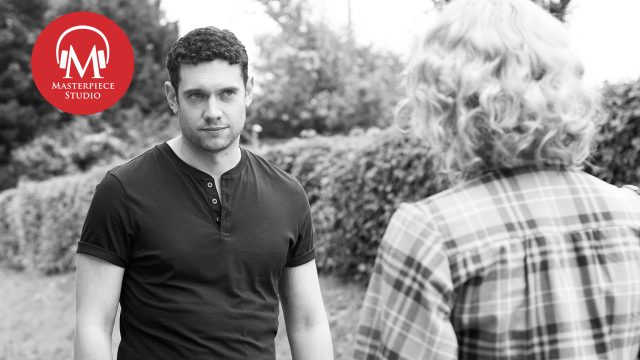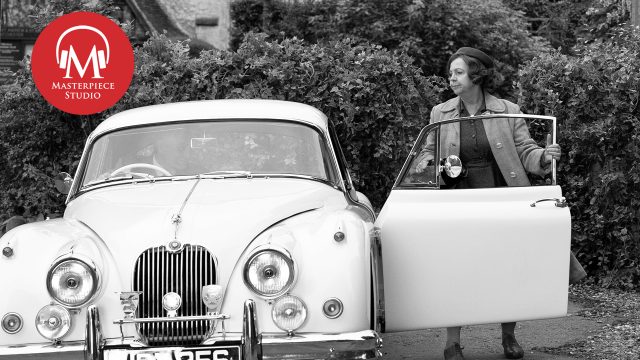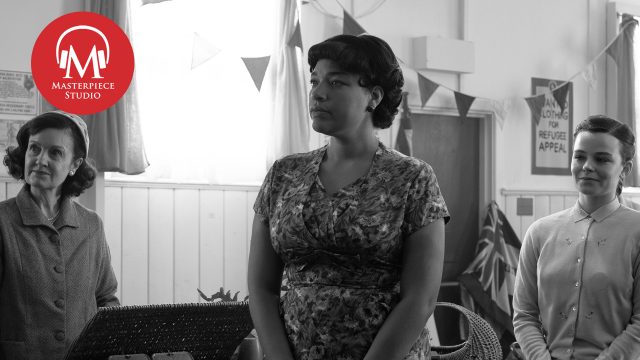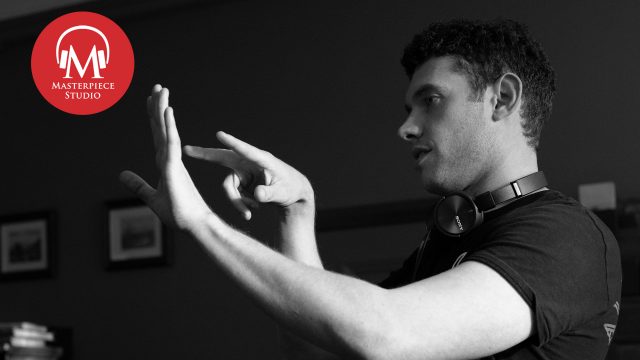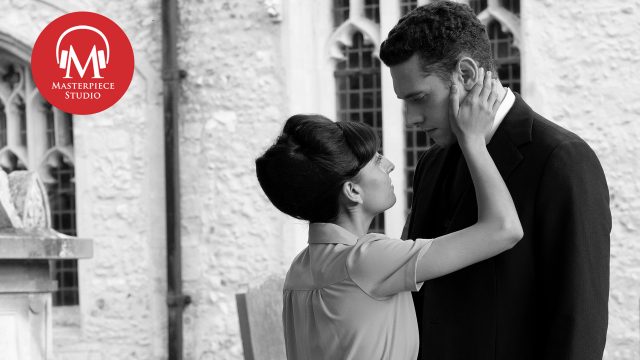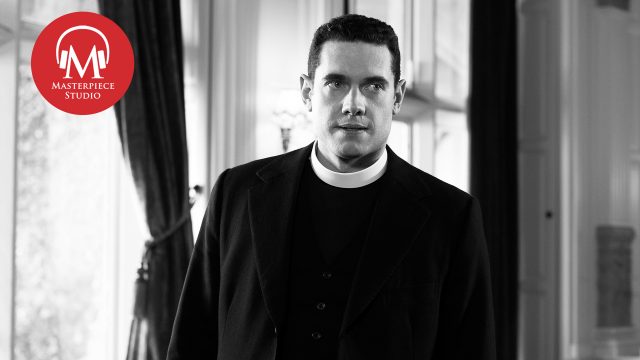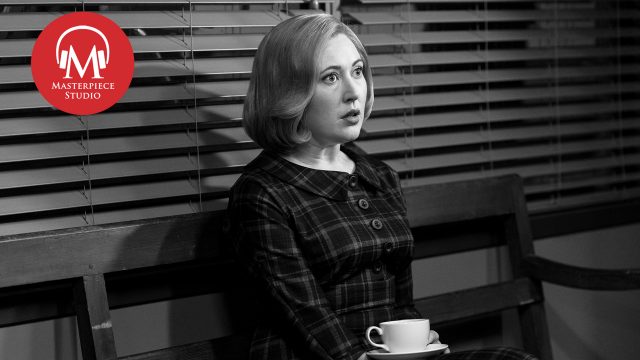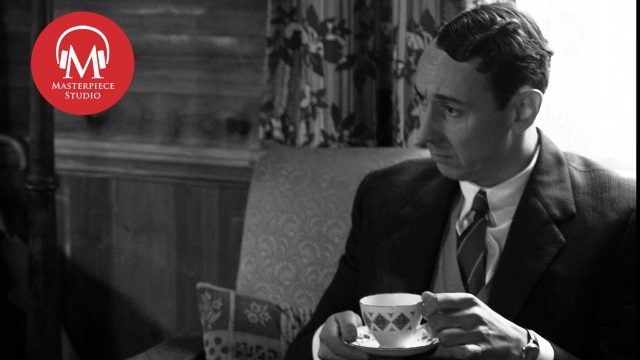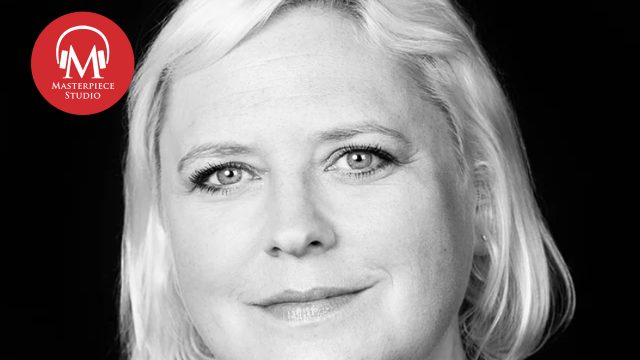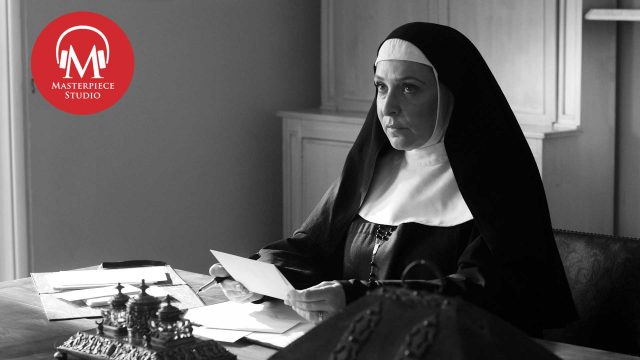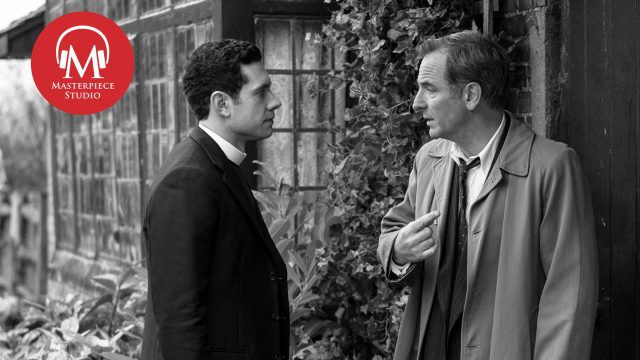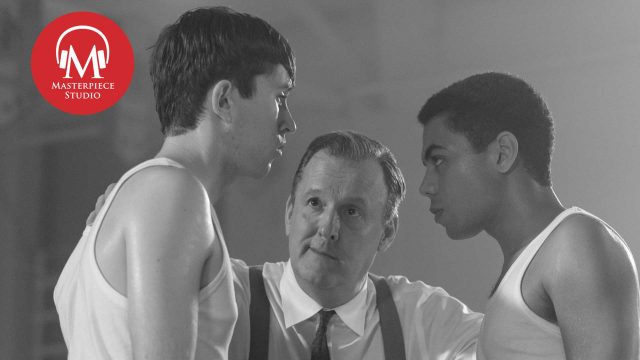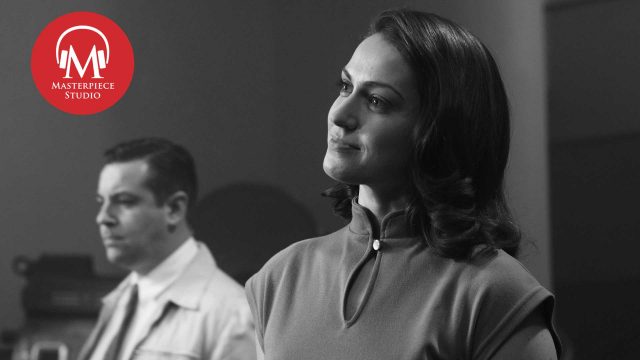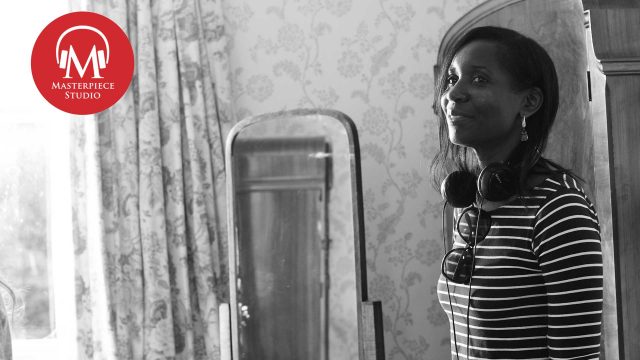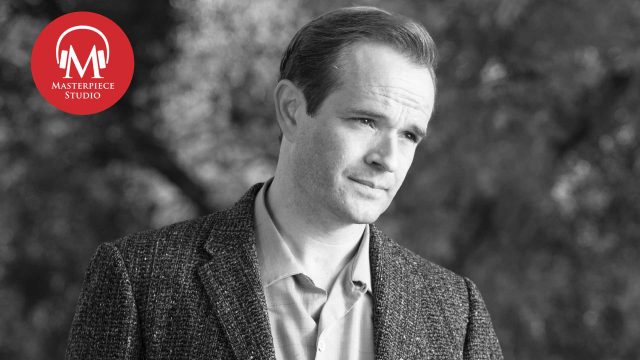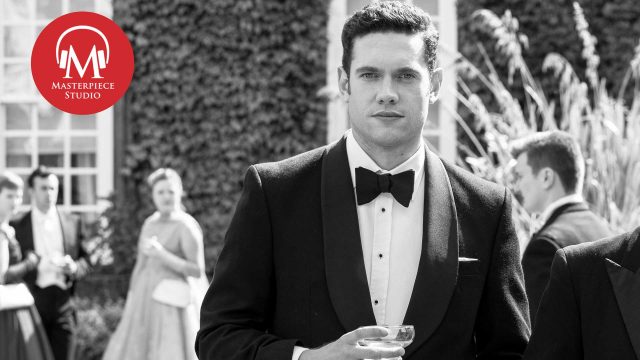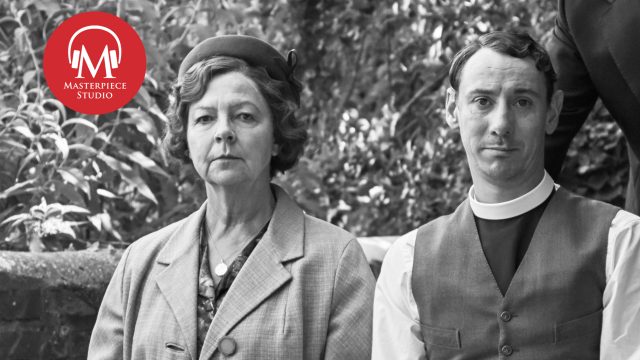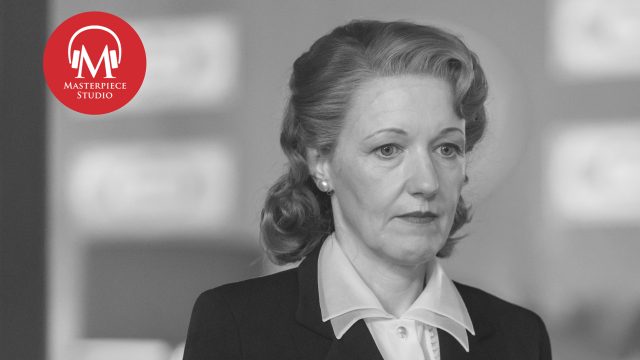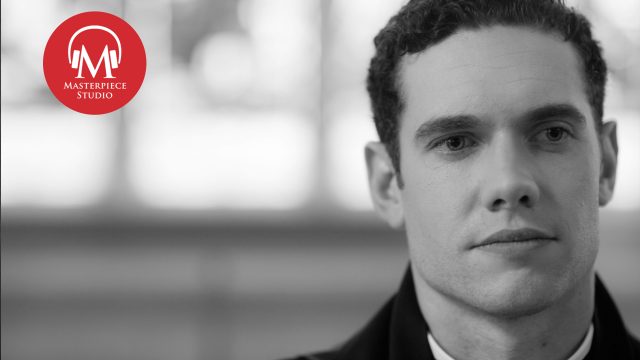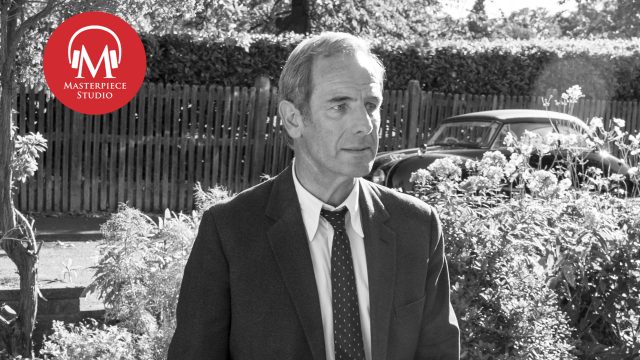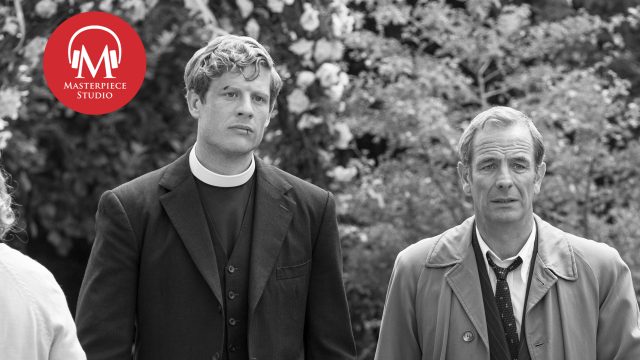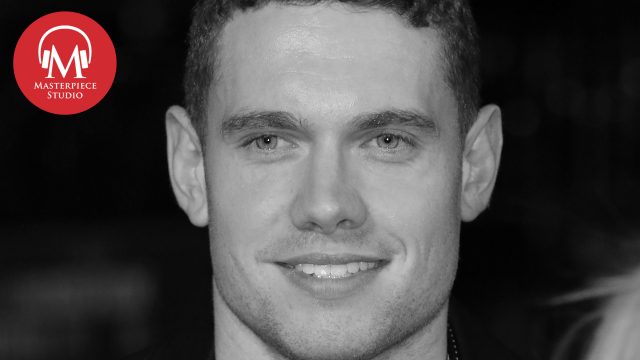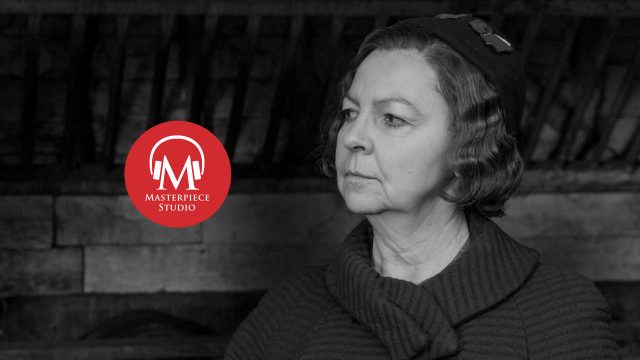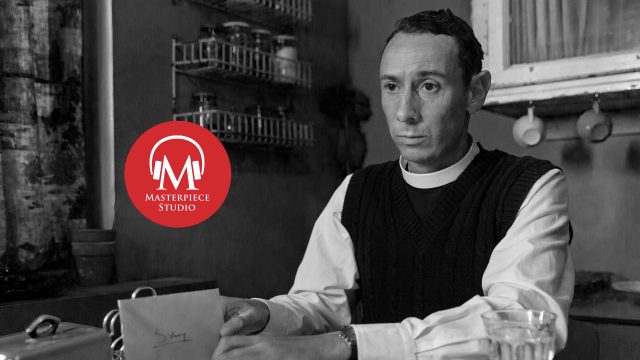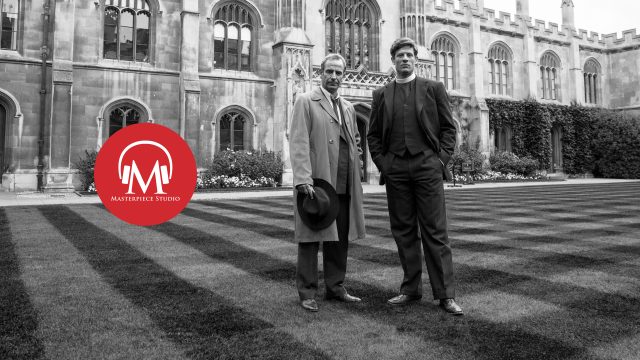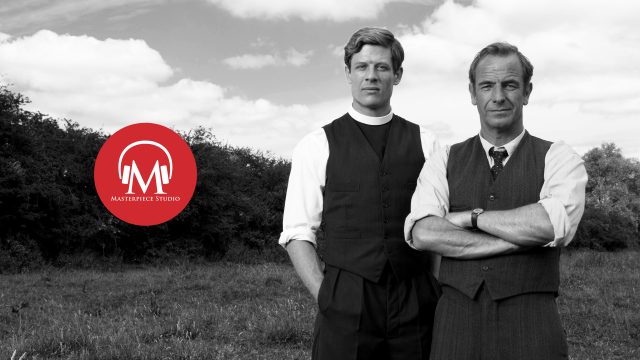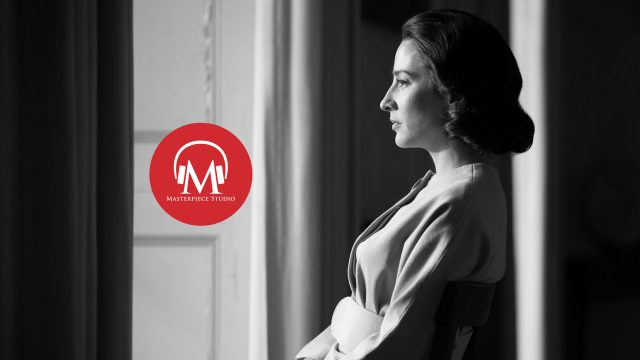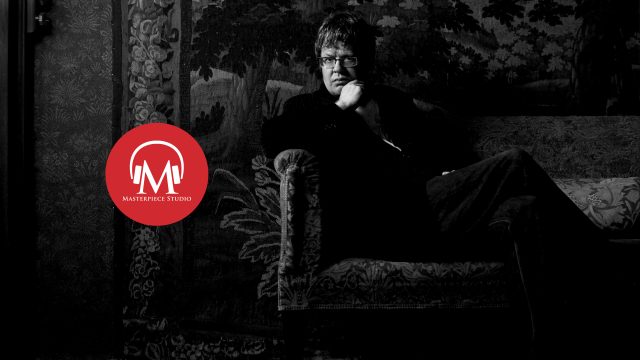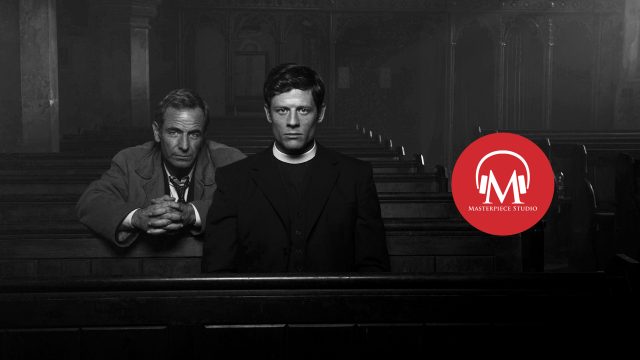The comic and dramatic collide in full force in the picture-book village of Grantchester, perhaps in this upcoming third season more than ever. Most of that mood comes from lead writer Daisy Coulam, who joins MASTERPIECE Studio to unpack her writing method, the show’s distinctive moral messaging, and the secrets of the season yet to come.
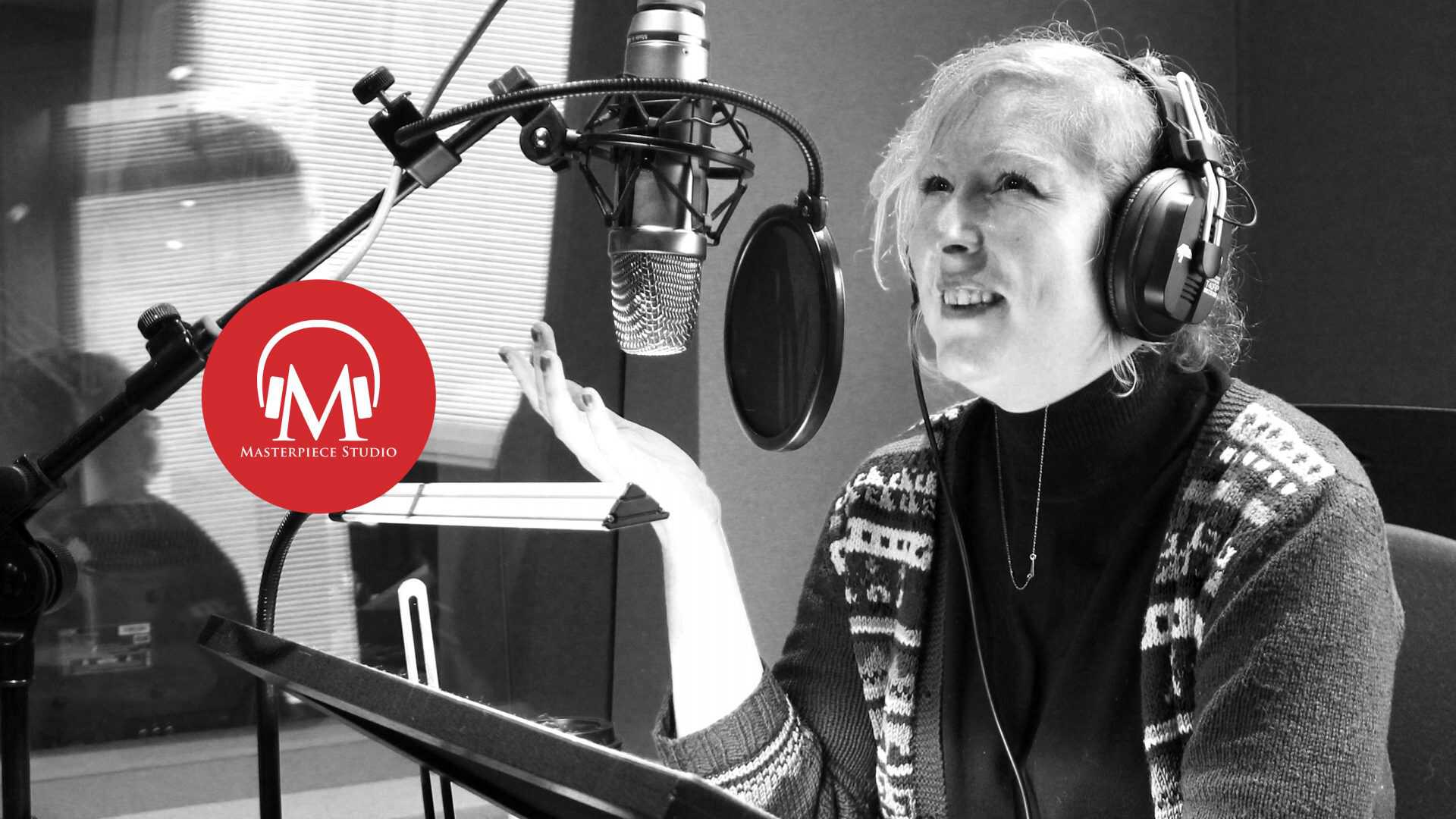

Writer Daisy Coulam Finds Humor in Grantchester’s New Season
Released --:--
Related to: Grantchester, Season 3
Download and subscribe on: iTunes | Spotify| RadioPublic
Transcript
Jace: I’m Jace Lacob, and you’re listening to MASTERPIECE Studio.
Grantchester is back on our screens this week, with more stories of morals, 1950s jazz music and…murder.
CLIP:
Geordie: You line them up in a row like toy soldiers, and pick them off, one by one. Kill, move on. Kill, move on. I’d almost believe it was that easy, if it weren’t for the wedding rings. That was an act of aggression. An act of anger.
Jace: The dashing Reverend Sidney Chambers and his gruff Detective Inspector partner, Geordie Keating, are again in hot pursuit of suspects — and, for many characters this season, romance.
CLIP:
Amanda: So, I’m not going to be around much for a while. Not until this one makes an appearance. Are you afraid?
Sidney: The more you fear the more fear finds you.
Amanda: How’s it all going to work Sydney? You, me, the situation?
We sat down with Grantchester’s lead writer and executive producer Daisy Coulam — who adapted the best-selling James Runcie novels for television and has written all but four of the series’ episodes — for a conversation about her writing process, how the show has changed in the last three years, and what’s in store for Sidney, Geordie, and Amanda in the upcoming season.
Jace: We are talking this week with Grantchester writer and executive producer Daisy Coulam. Welcome.
Daisy: Thank you. It’s very nice to be here.
Jace: While we’re now in seasons three of Grantchester I am curious about the project’s origins. How did you come to be involved in adapting James Runcie’s novels for television?
Daisy: So, ah, it’s a kind of biblical connection really. Diederick Santer, who is exec producer, his dad was a bishop and worked with James Runcie who writes the novels. James Runcie’s father was Archbishop of Canterbury, — basically Diederick brought me the book and said, um, I think you’re going to love and I read it in an hour and half I think on a train journey and I could just visualize it, completely see it. The characters just lept off the page and so, well, I suppose, quickly in television terms it took about two years to get from page to being filmed, so not too bad.
Jace: What was it specifically about James’s novels that you connected with the most?
Daisy: Well, firstly the sense of place. You’ve got Grantchester, which even I didn’t realize was a real village, it’s a real bucolic, beautiful place, but, what James’s books do is kind of dig into the underbelly of this very kind of nostalgic world and, kind of focuses on, Sidney Chambers, this really charismatic, charming clergyman and for me it was about the setting, it was about the characters and it was about, you know — the murder stories are kind of melancholy and complex and they kind of explore big themes of, you know, life and love and they’re not just baddies and goodies, it’s — Sidney’s approach to it is to, love the sinner and hate the sin — the complexity of it was what interested me.
Jace: You received news of the ITV commission while you were in a rather unusual place, is that correct?
Daisy: Yeah. That’s true. How’d you know this? You know everything?
Jace: I do my research.
Daisy: Yeah I was on honeymoon with my husband in Costa Rica in the middle of a jungle and, eh, we both had jet lag and it was six in the morning and we got a phone call, and, we’re like, it’s- it’s been green lit and, we didn’t know if it appropriate or not but we drank beer at six in the morning. Just to celebrate.
Jace: Now the first Sidney Chambers novel in particular provides a pretty detailed roadmap for what became the first season of Grantchester, what were the biggest challenges in terms of creating that first season arc or collaborating with James?
Daisy: James Runcie is one of the most collaborative people ever. I mean, he, he very much understood that, um, ah, a television series and a novel are very different things but he also had the building blocks exactly right. He had six chapters, in his novel and we had six episodes and he had, you know, the core cast he’d created. It’s- It’s … I suppose, what we’ve done, first series was pretty close, definitely to his first novel, and then we’ve sort of veered off on our own path, which … with his blessing I’ll add, he’s absolutely fine about that.
Jace: I mean, in that, obviously Sidney and Amanda relationship is a huge divergence from the novels given that he married Hildegard in the books.
Daisy: Yeah.
Jace: Do you view the Sidney and Amanda romance as one of the hallmarks of the show?
Daisy: Yeah, for me, I suppose, because I also loved Hildegard, but I suppose in the- in the books he settles down with her. He has a child with her and it’s quite a safe kind of non-conflicted life and for me when I read the book, Amanda and Sidney’s relationship this kind of friendship but with something kind of simmering underneath. You know I’m a sucker for star-crossed lovers and that’s for me. That’s kind of formed the backbone of all three series and the Christmas special actually, yeah. It’s those two.
CLIP:
Mrs. M: Mrs. Hopkins? I had some odds and ends in my quill basket, so.
Amanda: Thank you.
Mrs M.: You won’t need to bother Mr. Chambers further, will you? Your situation could do no end of damage to his calling. I’m sure you wouldn’t want that.
Amanda: Of course. You were the one who came to me. You said such wise things. You gave me such courage.
Jace: Is it true you always envisioned Robson Green in the role of Geordie Keating when you were writing the scripts for season one?
Daisy: I think it’s fair to say that, uh, James Runcie envisaged him for when he was writing the books, so yeah, it’s straight from the — the description in the book is actually, it’s basically Robson. But at first we couldn’t, um, there was some kind of trauma at first because he was filming in Thailand actually at the time we were supposed to be filming the first series and he was basically a “no.” We were kind of, everyone was desperately searching, “Who could it be? Who else could fit this role so well?” And then, as luck would have it somebody was injured on the set of the thing he was filming in Thailand, which was obviously a terrible thing, but for us was kind of a gift because Robson came straight back on, you know — I don’t think he had any prep. No rehearsals, straight onto the set with James, and it was kind of magic, really. Almost. Apart from the man who hurt himself.
Jace: Apart from that. Apart from that.
Daisy: Yeah.
Jace: In the first Grantchester script you describe Sidney Chambers as quote, “Tall and handsome, in his early 30s, a lover of warm beer and hot jazz. A gentle smile that suggests he’s always prepared to think the best of people.” What do you think James Norton brings to the role of Sidney Chambers?
Daisy: All of that and a whole lot more I think James’s audition was the only one I sat in on and that was because everyone was convinced he was so perfect. I mean he, firstly he studied theology at Cambridge which is, you know, as backgrounds go is almost spot on. But, James himself, I don’t know whether you’ve met him but he’s very warm. He makes you kind of feel like you’re the only person in the room. He has all those qualities of Sidney but also of a vicar. He’s- he’s always willing to think the best of people is James, but also he brings, not to be crude, but he brings a sexiness to it and he brings an edge of darkness because, I suppose the danger with the character was that he would just be too nice really, but you always get with James there’s an- an edge to it as well, which is…He’s perfect, really. Absolutely perfect.
Jace: Yeah. I would describe him as sort of charmingly disarming.
Daisy: Yes.
Jace: In person.
Daisy: To see him chatting to fans and things, he makes them feel like they’re the only person there and it’s really sweet of him actually.
CLIP:
Geordie: I’ve got Cathy’s family to send on Christmas Eve. Still it’s a nice reminder.
Sidney: Of what?
Geordie: Of why we avoid each other the rest of the year.
Sidney: I’m gonna start charging a penny for every moan.
Geordie: Four sisters. Four. Like a quintet of Cathys!
Sidney: Actually, let’s just save time. Give me your wallet.
Jace: In interviews Robson Green has noted that you’ve picked up on the rapport that he and James have and brought it into the show. How does James and Robson’s dynamic inform Sidney and Geordie?
Daisy: I suppose I’d written maybe three or four scripts before they got together and I remember sitting with Emma the producer and, her showing me the first rushes and going, “We’ve got something incredible here from the very first day of filming.” They did a really long pub scene and you could just see it. There’s a spark between them and that was on the first day, so we knew we had something special and I think we kind of went back over the scripts at that point and put all that kind of banter that they have. They’re terrible on set sometimes they get very naughty because they just make each other laugh all the time, but there’s a real love between them and with all the cast actually the … Al Weaver and Tessa Peake-Jones and Kacey Ainsworth, Morven all of them have a real love and warmth for each other and I think that shows through on screen actually.
Jace: When Robson isn’t almost pushing James into the River Cam.
Daisy: I know.
Jace: Drowning.
Daisy: Did you see that?
Jace: Yes. Yes.
Daisy: He was awful. I was there … actually I was there and completely missed it. Everyone was like … you know the director was getting very snippy and saying, “You know, nobody’s dying on the set today please because Robson really pushed him in.” It was quite funny.
Jace: And looking at the scripts themselves, do you approach each episode by starting with a theme, character or the, the murder mystery.
Daisy: It usually starts, so, Emma, the producer and I, and Richard, our script editor will sit in a room with lots of coffee and sweets and, erm, we’ll start…For us it’s all about the characters. It’s all about Sidney and Geordie and that’s where our interest lies in the crime story whilst having to be a bit knotty and intriguing is … kind of … I don’t know the background to their story, so it always starts with them.
Jace: It’s become rare to see representations of faith on television that aren’t played for either comedy or uncomfortable earnestness. How does Grantchester shift the conversation about faith and morality?
Daisy: I think from the beginning James Runcie when he wrote the book was very aware that the clergy has been represented as … yeah, just silly and kind of one dimensional and that was his intention with Sidney Chambers was to create a man who, you know, was real and thoughtful about religion and I think for us that was very integral to the series, would be to treat religion with respect and not to shy away from hard issues but also not to undermine that Sidney is a man of God and, I mean very early on we said, “Each episode, where possible should end with a sermon,” because it- in a way each- each episode is a musing on faith and life and all those things and it’s almost, uh, kind of Jerry Springer, this summing up at the end of each episode. Really, what the themes of the day were.
CLIP:
Sidney: We can learn so much from the symbolism of christmas. From the Christ Child himself. The fragility of that baby is a reminder of our responsibility to love and care for one another. The candles of Christmas represent the hope. The hope of our own flickering humanity.
Jace: Some viewers commented about how dark Grantchester got in season two despite the fact that in James Runcie’s first book Amanda is kidnapped and nearly raped. How do you respond to that criticism? Is it a case of viewers expecting Marple and getting something that’s weightier?
Daisy: Oh, I … I think season two did go quite dark and we- and we’ve sort of maybe lightened it a bit in the third series. I’m not sure but I think you’re doing a murder mystery in a sense you have to go to dark places and Sidney because he is a complex character has to kind of delve into these murky worlds and it- it if you don’t treat it with some kind of gravitas then I think there’s a danger that it just becomes very light.
Jace: This season moves from moments of lightness to really distressing darkness at time. How difficult is it to play off those tonal shifts in the writing?
Daisy: I find the the lighter stuff much easier to write, if I’m honest, but the balance I think, it’s all about the balance. You can’t- you can’t just kind of plumb the depths of, you know, horrible sadness and not have some kind of warmth there, otherwise you just lose everyone and sometimes it’s quite a joy to go from a tricky dark scene to just you know, Mrs. Maguire getting cross, or you know, Dickens doing something sweet. I think it’s all about the balance.
Jace: In addition to murder mysteries, Grantchester explores the dark underbelly of life in the 1950s, those social tensions that lurk beneath the chocolate box facades of this charming village. How does our vantage point in the present inform these explorations and how does it reflect our own struggles today?
Daisy: I think we’re all kidding ourselves if we think the 50s were this kind of bastion of, you know, just goodness and nobody did anything wrong. I mean, it’s an interesting time the 50s because you’re kind of post war and you’re leading up to the 60s when, you know, the world kind of became a very different place, so it’s quite interesting just to explore those themes and that sort of sense of just really, really shining the light on the hidden stories, like Leonard’s story is very much a story that in the 50s would have happened, I’m sure would have happened but just wasn’t spoken about, so it’s- it’s finding the taboos and shining a new light on them I suppose.
Jace: Leonard has a line in this first episode about Brecht, “Art is not a mirror with which to reflect reality but a hammer with which to shape it.” Which begs the question, is Grantchester mirror or hammer then?
Daisy: Oh, I would say, I would say both. I would say both. I I doubt there’s many people who are going to have their lives shaped by watching Grantchester. If we can entertain them and maybe make them think I’d be very happy with that but, I mean it’s, it’s interesting people do respond especially to Leonard’s story this season has been a story that people have responded to, and it’s made- it’s made people angry which I think is always a good … maybe a tool for change. Maybe that’s a hammer. Just to get people thinking.
Jace: I was quite surprised at the show skipped ahead to the birth of Grace so quickly, what was behind the decision rather to skip through Amanda’s pregnancy to the arrival of Grace and did the timing of a Christmas set episode clinch that?
Daisy: It totally did. I’ll tell you the- truth of behind this is that. We started writing season three and we were sort of part way through writing that when they said, ITV who’s the- the company that show it here in England they said they wanted a Christmas special so we kind of retroactively fitted the Christmas special and it’s perfect because of the first thing Emma the producer said to me, “Well, we’ve got a woman who’s pregnant and not to be too clichéd and flippant about it, it’s perfect Christmas fodder,” so and- and time wise it worked out perfectly we ended in autumn in series two and so it- it kind of bridged that gap and we just wanted to very much focus on that kind of exciting new birth.
Jace: Along those lines, I mean there are overt parallels with the nativity, you mentioned the pregnant woman, who is in fact trying to find shelter as the storm arrives.
Daisy: Can you see where this is going yet?
Jace: That makes perfect sense for a Christmas set episode but was it just meant to be that it would fit so perfectly with Amanda and Sidney’s situation?
Daisy: It was a complete fluke that we got it to work like that and, with the Christmas episode you want all those kind of tropes I suppose, you know, a pregnant woman, you want the snow, you want nativities and carols and all of that but it’s just we … what we were desperate to do is fulfill all those you know, prerequisites and add another layer to it so that’s what we tried to do.
Jace: And they are very tricky things to pull off Christmas episodes much less when you also have a grotesque murder to solve.
Daisy: Yeah, within it.
Jace: Finding that balance of sweet charming dark mysterious can be really difficult. What were the challenges in terms of walking that fine line with this specific episode?
Daisy: Yeah, again, I’ll be very honest. We went through many permutations of this episode. At first we were trying to cram in a really complex crime story and we kind of took a step back and went, “What- what we need here is a crime story that isn’t too emotionally draining that gives us some kind of intrigue but is … has also got some big bold characters, but gives us space to, kind of explore Sidney and Amanda and to meet her Aunt Cece and to, you know, to explore their Christmas.”
Jace: I love the episode’s unexpected moments of humor whether that’s Leonard’s beach birth confusion or-
Daisy: Yes.
Jace: Or Mrs. M’s lovely womb, or Sidney’s line, “I’m starting to feel like a vicar in a strip club.” How do those moments of comedy help to puncture or diffuse the tension here?
Daisy: I’m always looking for moment- moments of comedy. I find I get inspired more by watching comedy than I do by drama, actually. I find watching things like, “Kimmy Schmidt” and, you know, those kind, those kind of shows so I- I’m always desperate even in a very tense scene to find the humor in it because that’s reality really, you know? We’ve all been in terrible situations or funerals or something where somebody’s made you laugh because that’s true to life … yeah that’s the truth in it really.
Jace: While she’s only in this one episode I absolutely loved Anna Chancellor as Amanda’s Aunt Cece.
Daisy: Oh. She’s beautiful isn’t she? Just so good.
Jace: So good. I mean she’s great in everything but I love her here. Any chance she could return down the line despite her decision to choose finances over family?
Daisy: I would love that. I just, she somehow … sometimes an actor comes in and just totally owns the part from the moment they walk on…as soon as you saw her you’re like, “Yes, that’s- that’s exactly what I meant,” she- she kind of captured the essence of Aunt Cece for me was always this kind of bright and breezy and optimistic person and Anna Chancellor does it with such grace and good humor and she just totally nailed it. It was brilliant.
CLIP:
Cece: House rules, Sydney what did we agree?
Sidney: No sliding down the banisters?
Cece: No canoodling in plain sight
Sidney: I always forget that one.
Cece: There’ve been whisperings, amongst the servants.
Sidney: Well, henceforth, I shall be a model of discretion.
Cece: You haven’t thought about it at all, have you? How’s it gonna work? The two of you, with another man’s child?
Sidney: We’ll be fine.
Jace: Amanda’s father, Edward, tries to push her to return to Guy and forces Cece to rescind her invitation to her niece. While this is 1954 why is Edward so determined to punish Amanda?
Daisy: I think Edward, for me, is not a bad man. He’s just a product of his time and he … he believes very much in the sanctity of marriage and he believes, you know, you do not disobey your father and I think…we may be in ’54 but those, those kind of rules were still around. We still had, um, women who were divorced or left their husbands were treated very badly and, um, we heard lots of stories. We spoke to a lady who had been divorced in that time, she couldn’t buy a sofa because they wouldn’t deliver it unless she gave her husband’s name. You know, it’s things like that. It was very much frowned upon so it’s … he’s not a bad man he’s just, he just doing what … all he knows really.
CLIP:
Amanda: I bought the boys Meccano. They used to stay up do you remember, building by torchlight.
Edward: Guy would have you back.
Amanda: I wasn’t sure if they were too old now, for the…
Edward: Apologize and he’ll take you back.
Amanda: I’ve made a lot an awful lot of mistakes. I’ve hurt an awful lot of people, I’m not proud of that.
Cece: She’s not coming home, Eddie.
Edward: Then your aunt regrets that she must rescind her invitation.
Cece: I beg your pardon?
Edward: Christmas is about family. You can no longer claim to be that.
Cece: Don’t you dare do that, don’t you dare speak on my behalf.
Edward: Your husband is my employee and your son is my employee, so I think I can speak for you, Cecily.
Jace: It’s Leonard who comes to Amanda’s rescue taking her back to the vicarage, why was it important that it’s Leonard who finds her?
Daisy: There was no agenda in him inviting her back. It’s not, you know, if it had been Sidney it would have been … it would have been much more angsty to invite her back. Leonard is just, he sees a woman in trouble, of course he’s going to bring her back to the vicarage even though you know this is a taboo to do that. Al in that scene. we always say it’s his “It’s A Wonderful Life Moment” really. Him against the snow and he just looks so … he looks like a 50s film star. It’s brilliant.
Jace: This episode was shot in October, which makes the likelihood of natural snow rather impossible.
Daisy: (laughs) Yeah.
Jace: What was it like working with the snow machines?
Daisy: Well, firstly it was super hot, super hot days – sunny days for some annoying reason. Only days in England where decided to be blue skies and bright sunshine …the snow machines were amazing though. These guys just come out and they’ll cover … so they did the entire graveyard and the church and the vicarage in snow and it’s such a weird feeling just standing next to the snow — it makes you feel cold. I think apparently it’s the snow is actually made of the stuff that they put in diet shakes to, to bulk them out and make you feel full. Very odd, but it’s- it’s basically paper which doesn’t make me ever want to drink a diet milkshake.
Jace: No, I’d imagine not. I love the final moment of this episode with Sidney, Amanda and the baby under the mistletoe. It’s such a beautiful moment but one that’s filled with uncertainty.
Daisy: Hmm.
Jace: Is there any hope of happiness for an vicar an unmarried mother in 1955?
Daisy: I think there is happiness for a little while. They live in this bubble of kind of joy and dancing and pretending they’re a couple but the reality is they can’t be together and even if she divorced Guy, she still can’t be with him, so they’re in an untenable situation so even though we’ve retroactively created the Christmas episode, we wanted to leave it on a kind of cliffhanger of, you know, reality’s about to set in.
Jace: Hmmm.
That was Grantchester writer and executive producer Daisy Coulam… looking ahead to a new season of murder and faith in 1950s England. Is there any hope for Sidney and Amanda? Tune in Sundays at 9 PM ET / 8 PM Central to find out.
Next week, we’ll speak with Stefanie Martini, the talented young actor heading up the cast of the new prequel series, Prime Suspect: Tennison. She’ll tell us what if felt like to try and fill the shoes of Dame Helen Mirren in her classic turn as Detective Chief Inspector Jane Tennison in the original Prime Suspect.
CLIP:
Stefanie Martini: I think the last thing that I wanted to do, because it’s such an iconic performance, is to do a kind of watered down rubbish impression [laughs] of Helen Mirren. I thought it’s just best to, just kind of keep it completely fresh. But it is so useful to know where she ends up.
To catch that interview—and all other behind-the-scenes conversations from the third season of Grantchester—be sure to subscribe to MASTERPIECE Studio on iTunes, Stitcher, or your favorite podcast listening app. While you’re there, feel free to leave a review so other MASTERPIECE viewers can find the podcast for themselves.
MASTERPIECE Studio is hosted by me, Jace Lacob and produced by Nick Andersen and Rachel Aronoff. Elisheba Ittoop is our editor. Special thanks to Barrett Brountas and Susanne Simpson. The executive producer of MASTERPIECE is Rebecca Eaton.
Sponsors for MASTERPIECE on PBS are Viking Cruises, Farmers Insurance, and The MASTERPIECE Trust.
MASTERPIECE Newsletter
Sign up to get the latest news on your favorite dramas and mysteries, as well as exclusive content, video, sweepstakes and more.











